





The mission of Trinity Western University, as an arm of the Church, is to develop godly Christian leaders: positive, goal-oriented university graduates with thoroughly Christian minds; growing disciples of Jesus Christ who glorify God through fulfilling the Great Commission, serving God and people in the various marketplaces of life.

Excellence in nursing practice, research, leadership and education that embodies covenantal caring, fosters a spirit of inquiry, and contributes to the good of the world and the glory of God.
As part of a Christian university, the TWU School of Nursing holds that the educational experience should cultivate knowledge and personal development to serve God and humankind. The School of Nursing is guided by distinctive core values:
• Covenantal caring: faith-informed commitment; inestimable value of humans; compassionate response to human suffering; and support for the flourishing of life.
• Collaboration: person- and family-centred care; partnerships and teamwork; shared vision.
• Culture of Inquiry: trust, respect and generosity; curiosity, creativity and reflection; knowledge generation and mobilization.
• Transformation: reconciliation and impact on culture; character formation; responsive values-based leadership and mentorship.
• Equity: inclusivity and hospitality; dignity and opportunity for health; moral mandate to attend to structural vulnerability and inequities.

TWU Dean Dr. Sheryl Reimer-Kirkham was inducted as a Fellow into the prestigious American Academy of Nursing in November 2024 at a ceremony in Washington, D.C. Fellows of the academy are recognized for their significant contributions to global health and health care.
It is my pleasure to welcome you to our third Annual Report for the TWU School of Nursing. In it, you will read of our common Christian purpose to think deeply, act justly, and care generously. In our undergraduate and graduate programs, we go beyond technical skills and the expected standards required of the profession to emphasize spiritually sensitive and socially responsive nursing practice. For undergraduate students, this involves learning about providing spiritual support as an aspect of excellent nursing care for someone facing an unexpected health crisis or at the end of life. For master’s students, this involves equity-oriented approaches to health policy. For our doctoral students, we bring theology alongside philosophy to inquire into questions of meaning and responsibility for socially responsive research. And for faculty, we strive to create learning environments and professional relationships to facilitate such learning. Our professional service and research programs are also motivated by this vision.
This year, the University developed its Academic Strategic Alignment Plan 2024–2030 in conjunction with TWU 2030: Every Graduate Equipped. The Academic Strategic Alignment Plan has five themes:
• Engaging students in real world experiences;
• Advancing reconciliation with Indigenous Peoples;
• Focusing on sustainability;
• Incorporating global Christian perspectives; and
• Demonstrating operational excellence.
You will see these themes featured in the Annual Report as the School of Nursing prioritizes them.
The International Council of Nursing warns that the global nursing workforce shortage, now a crisis, is continuing to deepen. We aspire to be part of the solution by graduating resilient, hope-filled nurses, who grow in their leadership and influence. Our attention is on the health of the world’s populations and the health of the planet. We conduct research that contributes to the nursing knowledge required to care well for each person and their family in compassionate ways that foster equity and human flourishing. The School of Nursing Canada Research Chair (CRC) training and research program on Equitable People-Centred Health Measurement,
led by TWU professor and alumnus Dr. Rick Sawatzky, is an “innovation community” of nurse researchers, trainees, healthcare professionals, leaders, and patient partners. During the past year, the CRC training program has provided employed positions and support for four TWU doctoral fellows, three post-doctoral fellows/associates, two graduate students, and six undergraduate students. This year, the CRC research program has engaged over 11,000 participants across Canada to improve how we measure the health and wellbeing of diverse people and communities.
Visit the www.healthyqol.com website for information about the CRC program.
TWU nursing graduates comprise a growing alumni group (now numbering over 1,400 grads), engaged around the world. In this Annual Report, you will read about thriving students, alumni, and faculty. You’ll learn about our 2025 Travel Studies to Ethiopia and Uganda; our MSN and PhD students learning health and public policy in Ottawa; a scholarship project that supported spiritual caregiving in clinical settings; the recipient of the Advancement of Nursing Knowledge Award (Dr. Mi-Yeon Kim) and the Award for Planetary Health (Dr. Barb Astle); our BSN/MSN alumna Mary Wakutz and her global reach; and many more updates.
I am particularly grateful to many of you who donated on Giving Day, allowing us to surpass our fundraising goal for a newborn simulation doll that has joined our “family”!
With gratitude, I invite you to continue connecting with our TWU nursing community, whether as a current student, an alumnus or alumna attending our 2025 Homecoming, or a donor supporting our students, programs, and scholarship. We take to heart the words in Ephesians 2:10: “For we are God’s handiwork, created in Christ Jesus to do good works, which God prepared in advance for us to do” (NIV). May the TWU School of Nursing continue to be known for our way of life, exemplifying compassion and service.
Sheryl Reimer-Kirkham, PhD Dean, School of Nursing
What remarkable experiential learning for third-year undergraduate students to visit Richmond’s Highway to Heaven to learn from a Hindu community leader, a Muslim Imam, and a Buddhist monk about how patients from their faith traditions view health and healing, and how nurses can care well for them. This April field trip was followed by a twoday retreat at Camp Stillwood where arts-based reflections, deep conversations about Christian views of suffering, and contemplative practices drew students into knowledge of and appreciation for the connections between faith, values, and profession. Asking: Who am I as a nurse? Answering: I
am loved, known, and valued by the Creator. The concepts of covenantal caring and spiritual caregiving are woven throughout the four-year program, and this retreat adds immersive learning that includes consideration of how spiritual caregiving can vary, depending on area of clinical practice. Exploring: What is unique about spiritual support in mental health contexts, compared to pediatric settings? Learning: Person-centredness has nurses respond to the individual in front of them, considering their health status, social identity, and stage of life.

Global engagement happens locally. Trinity Western’s MSN program is partnering with four other B.C. universities for Indigenous Graduate Education for Nurses (IGEN). The vision of Dr. Lisa Bourque Bearskin (University of Victoria nursing professor and member of TWU’s Indigenous Nursing Council), the IGEN project is an Indigenous-led collaborative that is developing, implementing, and evaluating an Indigenous MSN education specialty stream for Indigenous nurses. In the specialty stream, IGEN students can take Indigenous-related courses at other universities while connected to their home university.
As a member of IGEN, our MSN program is undergoing an intensive curriculum mapping process to integrate Indigenous perspectives into all courses. As an example of this integration, our recent health policy residency in Ottawa had as its theme “Indigenous Health,” with rich co-learning amongst Indigenous and non-Indigenous nurses, all in response to the United Nations Declaration of the Rights of Indigenous Peoples and Canada’s Truth and Reconciliation Commission (TRC). Global engagement has as priority the rights of Indigenous peoples worldwide.

2024–2025

CURRENT STUDENTS
234
ALUMNI
1,176
103
13 Bachelor of Science in Nursing Bachelor of Science in Nursing Master of Science in Nursing Master of Science in Nursing Doctor of Philosophy in Nursing
231
FACULTY/STAFF
21 Full-time faculty (11 teach in MSN/PhD programs) / 12 Part-time faculty / 36 Clinical supervisors (18 each term) / 4 Staff / 4 Graduate teaching assistants / 20 Undergraduate lab-teaching assistants
17 Post-doctoral fellows, community researchers, and staff / 14 Doctoral fellows and graduate research assistants / 28 Undergraduate research assistants and interns / 14 Patient partners / 19 Indigenous advisory council members
TWU Nursing is delighted to announce a generous donation from the M. J. Murdock Charitable Trust to update our simulation mannequins and add a mobile medication dispensing system. The donation also funds a virtual reality (VR) nursing simulation system that will be integrated strategically into our lab education.
The needs of patients in clinical settings are unpredictable and changing. This can make for uneven, stressful learning for students because we cannot anticipate what they will encounter on any given day. To bring consistency and predictability in learning, lab simulations provide hands-on practice with specific learning outcomes that truly equip our students for the real-world environment as outlined in TWU’s vision statement, “Every graduate is equipped to think truthfully, act justly, and live faithfully for the good of the world and the glory of God.”
In the lab, learning is slowed down so students can understand various aspects of the situation and learn how to make decisions, communicate, and take the right actions. They learn to respond to simulated emergencies and real-world nursing pressures.
TWU’s Laurentian Leadership Centre (LLC) is an unmatched site for graduate education. Its magnificent architecture and spacious layout allow for more than twenty graduate students to learn and live together. TWU’s MSN program has hosted its distinctive annual health policy residency at the LLC since 2010, and the 2025 experience was as remarkably impactful as each of the previous 15 residencies. Nurses from Nunavuut to Southern Ontario, Whitehorse to Richmond, Edmonton to Montreal brought their unique clinical backgrounds into conversation with national leaders, policy-makers, and elected representatives (MPs). Adding to the learning were the connections between Indigenous and non-Indigenous students, as well as the mix of 16 master’s and five doctoral students. Hybrid capabilities made the residency accessible for another 10 online MSN students. Health policy seminars covered topics such as the nursing shortage and health workforce planning; priority plans to address Indigenous-specific racism (CNA) and health systems transformation for Indigenous health (Indigenous Services Canada); the digital management of health information and Indigenous data sovereignty (CIHI); and national nursing education (CASN). Renowned nurse leaders Ann Sutherland Boal and Josette Roussel joined TWU

In a supervised, simulated nursing lab, students learn things they may never experience in a live clinical environment. Debriefing sessions follow each simulation, when students reflect on what went well, how they handled their emotions, who supported the family, and team communication.

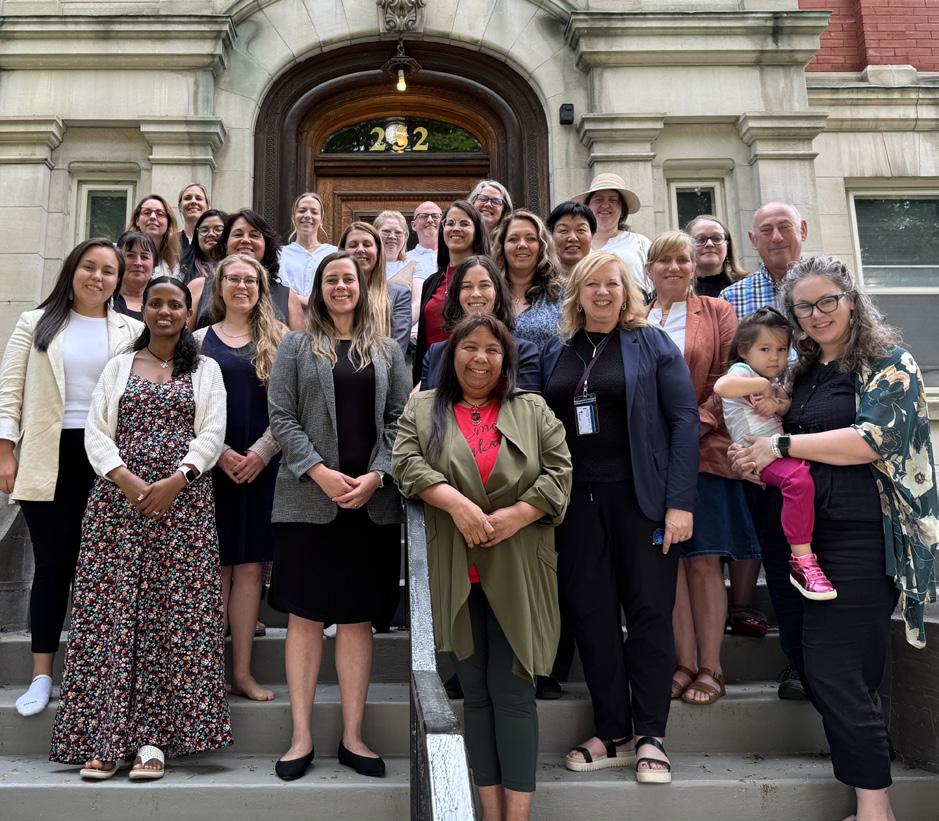
Leader-in-Residence Rob Calnan in front of the heritage fireplace to chat about pathways into leadership. Nursing faculty Sheryl Reimer-Kirkham, Kendra Rieger, and Kathleen Lounsbury guided rich learning, and Program Coordinator Eric Fehr provided technological and administrative support.
WHEN: MAY 14–JUNE 4, 2025 | WHERE: ADDIS ABABA, ETHIOPIA & RAKAI DISTRICT, UGANDA
“‘How was your trip?’ they ask. ‘Life changing!’ I respond.” Such was the opening statement of a TWU nursing student’s journal, reflecting the sentiments of many who participated in the 19-day travel study to Ethiopia and Uganda in May/June 2025, led by faculty Tammy Brandsma and Amy Hildebrand.
The syllabus stated that this experiential course would focus on concepts of global health. What the syllabus failed to capture, however, was how the students would feel and forever be changed by learning these concepts and other life lessons from the individuals they met and the communities they travelled to.

Students learnt about urban development in Addis Ababa, Ethiopia, partnered with an international non-governmental organization, Hope for Korah (HFK), whose Ethiopian staff and beneficiaries taught TWU students about family empowerment. HFK is based out of Kore, a slum district that began as a leprosy colony. Students observed HFK staff during home visits, health clinic assessments, and malnutrition screening at a daycare. While in Addis, students visited several hospitals where they learnt what acute care nursing in a resource-limited setting looks like. One final highlight in Addis Ababa was being hosted at the official residence of the Canadian ambassador for an evening
of learning from passionate women leaders from the judiciary, business, health care and education, who shared how they were stepping into gaps in their country’s capacity to meet needs.
Students spent their second week learning about rural development in the Rakai District of Uganda—“ground zero” of the HIV/AIDS epidemic in 1982. The team was hosted by Kuwasha International at Kibaale Community Center (KCC), with its large K–12 school, a health centre, agricultural training, and a coffee plantation. Students learned from local staff about acute management of health conditions endemic to Rakai (e.g., malaria and HIV/AIDS), and a
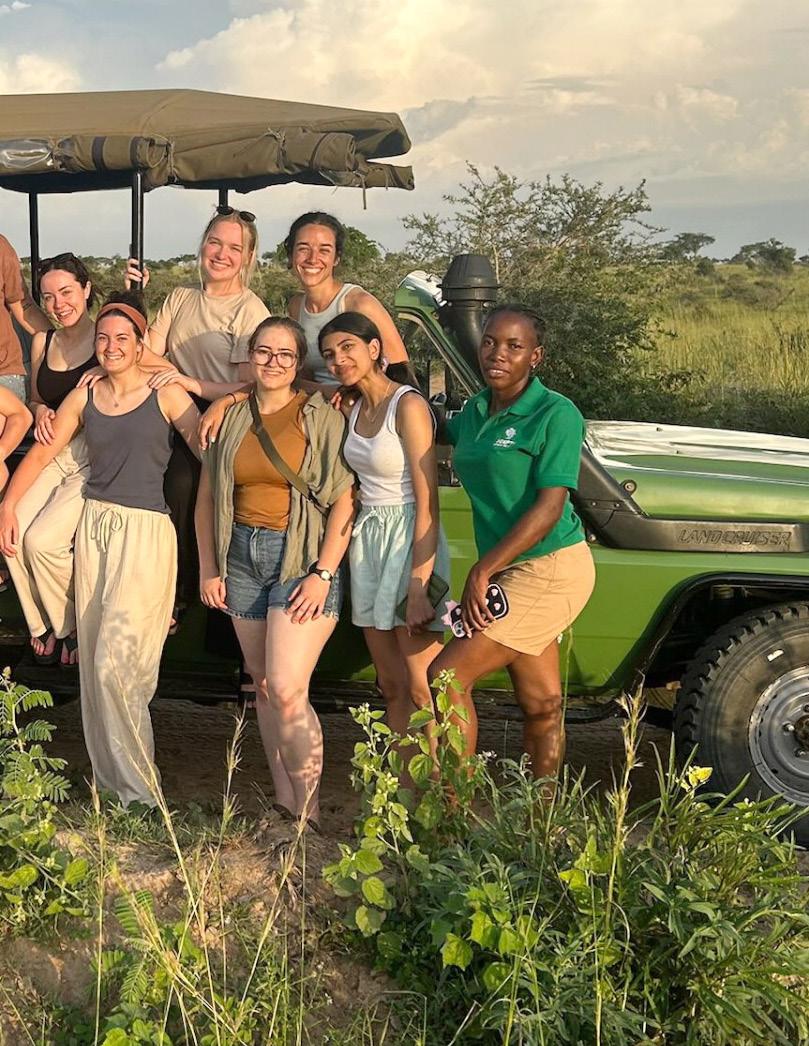
ccompanied them on outreach visits into neighbouring villages to observe immunizations and health education.
These contrasting experiences of urban and rural development were formative, but when summarizing their learning, students pointed less to activities they did and more to who they learned from: the local people. Instructor Amy Hildebrand summarized that such learning can act as a catalyst for students to become ambassadors and leaders in response to global health inequities. A student reflected: “How can you miss something that will stay with you forever?”

Joining more than 650 other graduates, 56 BSN and 26 MSN graduates were celebrated at the 2025 Commencement Ceremonies.
Kylie Kampman was awarded the Academic Excellence Award, and Malaya Brandsma was awarded the Nurses and Nurse Practitioners of British Columbia Professional Award. At the pinning ceremony, also held during graduation weekend, BSN graduands received the TWU nursing pin, with many of them being pinned by nurses in their families. Nursing faculty also gathered with MSN graduands and their families for a reception to honour
their accomplishments, especially their capstone projects. Stephanie Gillespie was awarded the MSN Outstanding Graduation Award. Graduation marks the achievement of all graduate requirements—the end of a rigorous academic and applied program—and an opening door to new opportunities to live out one’s passions and commitments, for the good of the world and the glory of God.
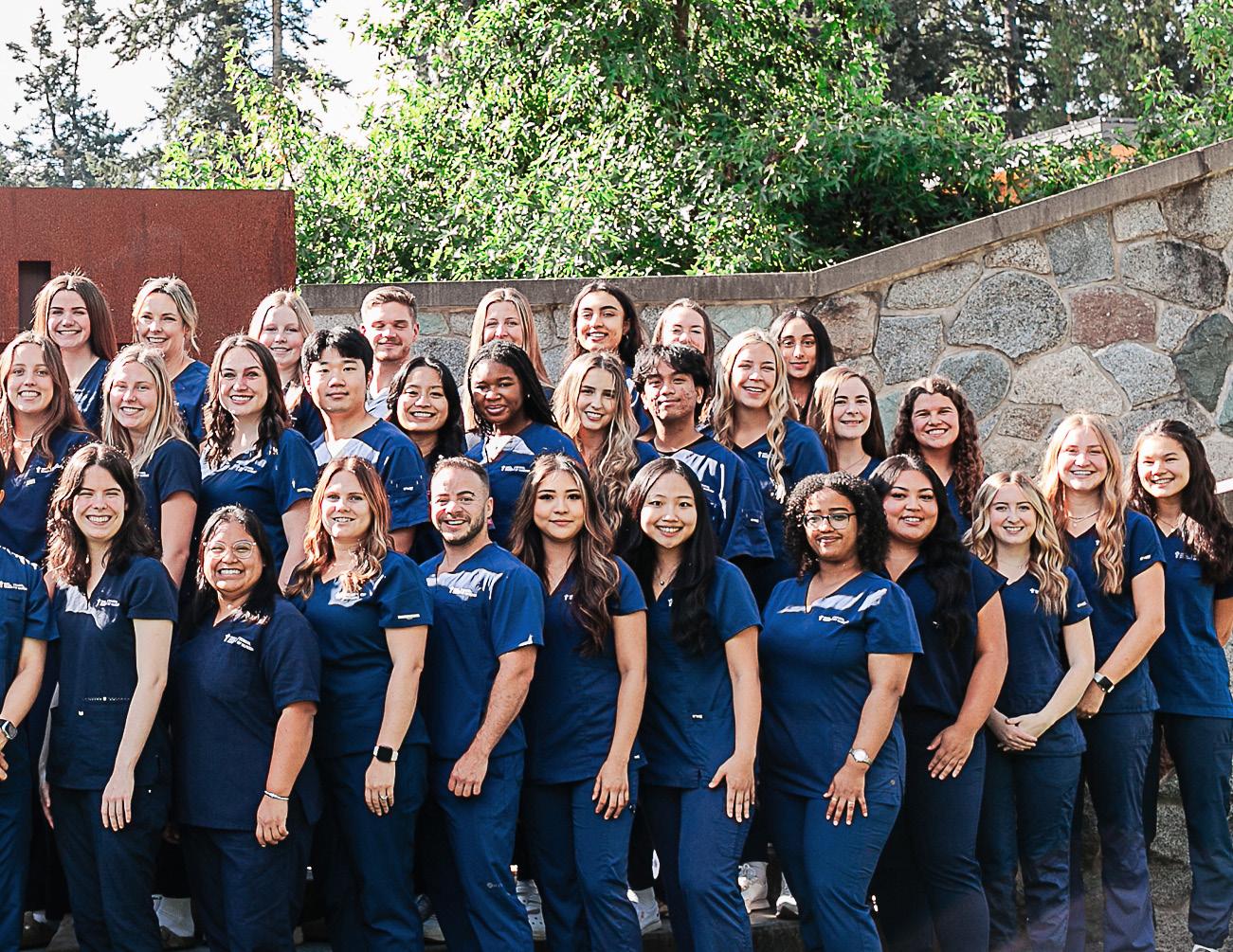

“
The biggest highlight is the community I was part of; the professors are so supportive and involved in their students’ lives.
SIDHU
Q: Why did you choose to pursue nursing and why at TWU?
A: As a first-generation Indo-Canadian and a child of immigrant parents, I saw the adversities that my parents and grandparents faced to ensure their kids had the opportunities for the education they didn’t have. From a young age, I understood that having an education was a privilege and wanted a fulfilling career to provide for those in need. TWU’s emphasis on centring learning on God was appealing to me. The Nursing program instills a whole-person approach to caring, focusing on the patient and not just their diagnosis or condition. I asked a nursing alumna about her experience, and she spoke highly about the professors and how invested and supportive they are. My admissions counsellor guided me through the process with compassion and kindness, and I felt a sense of peace as they gave me insight on how I would be supported throughout nursing school.
Q: You have served in various student leadership positions during your degree. What motivated you to do so? What is an initiative that drew the students together and contributed to the nursing profession?
A: As a Sikh, I highly value selfless service (seva). When I heard about student leadership positions, I wanted to serve my fellow nursing students. For example, I designed a language workshop on caring for Punjabi-speaking patients. I wanted
TWU nursing students to understand and speak basic Punjabi words, which would allow them to form trusting relationships, and so I designed cards with basic Punjabi words and cultural and religious considerations. Many students have mentioned how helpful the cards have been, which has made me so happy. I hope new generations of nurses are better equipped to care for diverse communities.
Q: What’s been a highlight for you in the BSN program and in the School of Nursing as a whole?
A: The biggest highlight is the community I was part of; the professors are so supportive and involved in their students’ lives. They are there to celebrate your accomplishments and to listen to you when things get hard. Over time, many become mentors; they support your goals and ambitions. When I had an initiative I wanted to accomplish, the professors were there with me, asking what they could do to support me. I have learnt so much about myself through the leadership positions I was in; I have understood how to lead a team, become more confident, and found my passion for leading and advocating for diverse communities in need. I have also met my lifelong friends here. I would not have had the experience I had without my friends. We supported one another and, at times, carried one another through nursing school.

“
Graduate studies equipped me with leadership skills that are helpful for navigating teamwork, projects, and the fast pace of health care.
STEPHANIE GILLESPIE
Q: Why did you choose to pursue your graduate degree (MSN), and why at TWU?
A: After 17 years of nursing, I was seeking a safe space to dig into hard issues and to explore some of the pressing health topics of our day—which is why I specifically chose TWU. As a Christian, I recognize that my values and worldview impact how I understand my role as a nurse. TWU weaves in a Christian perspective and creates opportunities for students to explore the impact of their beliefs and values on their practice. I was eager to engage in this type of inquiry as a way to address my moral distress and reaffirm my calling as a nurse.
Q: How has your graduate education impacted your approach to nursing and your career trajectory?
A: Graduate studies equipped me with leadership skills that are helpful for navigating teamwork, projects, and the fast pace of health care. In addition to my practice becoming more grounded in a relational and values-based approach to care, I have increased self-awareness of my character attributes that shape how I function and respond to others. I have always been proud to be a nurse, and now I have the confidence to share nursing perspectives at interdisciplinary tables and support quality improvement initiatives at my workplace.
Q: Adult learners with busy lives typify who completes a graduate degree. How did you find balance in holding multiple roles?
A: Crucial to finding and maintaining balance in my home, work, and school life was intentionally and consistently setting aside dedicated time to complete the weekly work. Being a graduate student required refined prioritizing skills, as my tendency was to want to do it all! Keeping family rhythms and routines, such as eating meals together, attending church, and my children’s extracurricular activities helped me make the best use of the time I had allocated for school as there was no room for procrastination.
Q: What’s been a highlight for you in the MSN program and in the School of Nursing as a whole?
A: The capstone project was a highlight as it integrated all I had learned in the previous courses and required application to my clinical setting. There were several “ah-ha!” moments that affirmed my learning and reassured me that the investment in grad school was impactful in the real world. Finally, the faculty at the School of Nursing were extremely supportive, and I felt an immediate connection through our shared faith. One particular highlight was when a faculty member willingly came to a conference on a weekend to participate in learning with me. Truly, I was blessed to have been mentored by faculty who are caring, humble, relatable, and open to learning along with the students.

You’re always listening and paying attention to things going on in the world for that purpose of contributing. We would hear these needs, talk about it, pray about it, and then if we could, we would go.
MARY WAKUTZ
TWU Nursing alumna Mary Wakutz (nee Kutyn, BSN ’14 and MSN ’21) has applied her nursing education and desire to serve the world to helping people in crisis.
Back in 2020 during the early months of the COVID-19 pandemic, Mary, along with her husband Matt (BSN ’15), traveled to Cremona, Italy to the site of one of the most intense COVID-19 outbreaks at the time.
Mary has always had a heart for missions work and for using her nursing skills to serve others around the globe, which was one of the draws to studying at TWU. Gaining skills through nursing has offered ways to serve God “by loving his people as well as share that love of God with others, particularly people experiencing such crisis,” says Mary.
Having been on a nursing travel study to Zambia during her undergraduate degree, it has been a natural fit for Mary to continue with various humanitarian medical missions, to places including Haiti, Uganda, South Sudan, Saudi, and India. Although it can be very challenging, Mary notes “it also opens the door to so many incredible opportunities for both work and serving locally and globally.”
Congratulations to Mary on being the 2025 recipient of the TWU “Live Faithfully” Alumni Award!
Q: What changes have you noticed in nursing education over the years, at TWU, in B.C., and across Canada?
A: Health employers tend to expect students to be practice
ready earlier than ever to cope with bigger challenges in terms of caring for patients, with higher acuity and knowledge of more sophisticated procedures and equipment. At the same time, opportunities for practice experiences in the hospitals
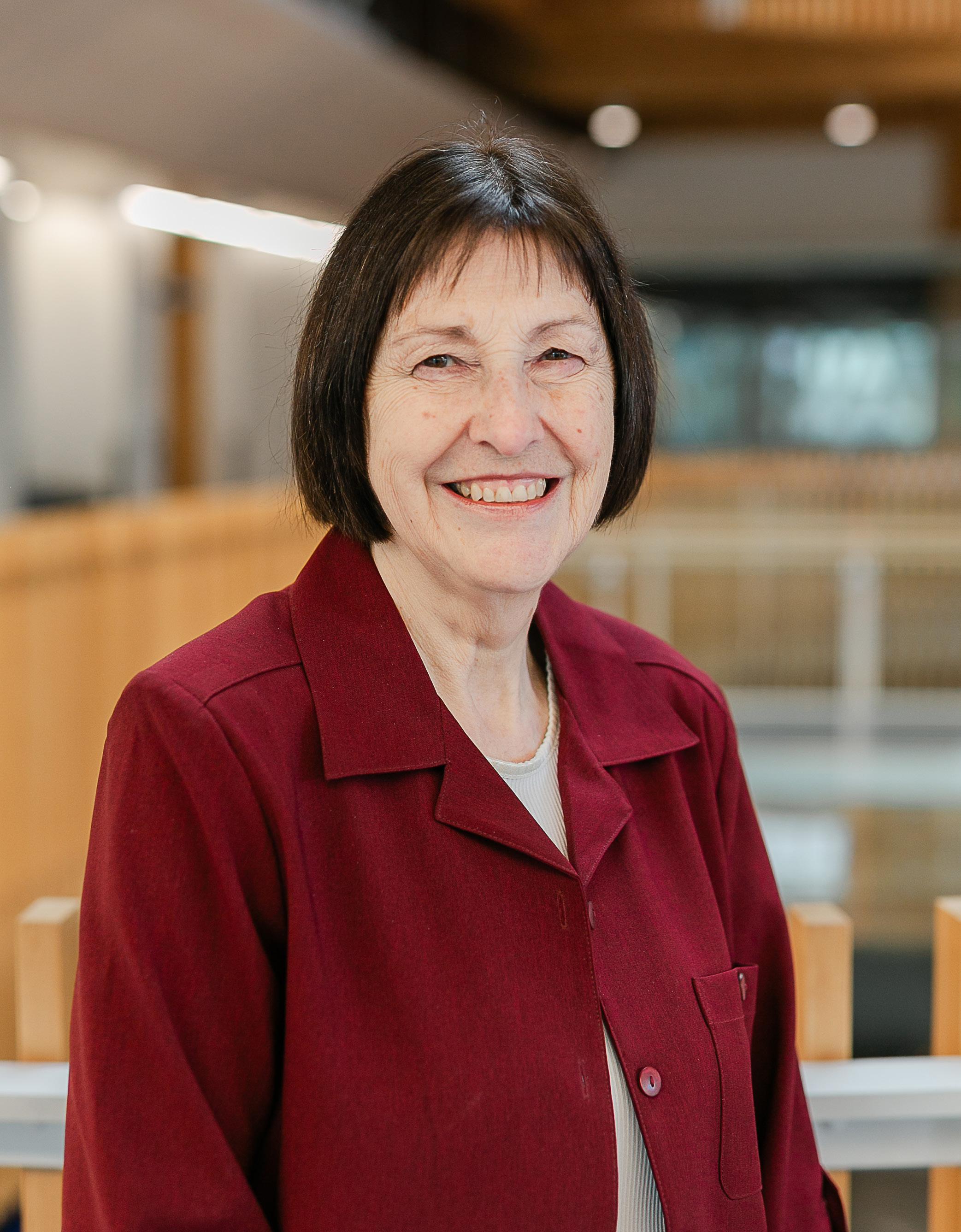
and in the community are becoming more difficult to secure. These factors demand a constant adaptation of theoretical education to facilitate students’ development towards becoming knowledgeable practitioners (beginning RNs) at the end of their education. For example, nursing schools, including the TWU School of Nursing, extend their curricula with simulation-based lab learning to prepare students for the practice environment.
Q: You have been honoured with a national award as a national accreditation program reviewer. What is the process of educational review (CASN)?
A: The Canadian Association of Schools of Nursing (CASN) Accreditation Program is based on a peer assessment of the educational unit and program. Nursing faculty from accredited nursing universities or colleges act as reviewers. Their task is to review the self-study reports on the education (administrative) unit(s) and nursing education program(s) under review provided by the school prior to an accreditation visit. During this visit, reviewers validate the information in the self-study reports; gather further information on each of the key elements where necessary; identify strengths, vulnerabilities, and opportunities; synthesize findings to be delivered in a debriefing session with members of the school; and develop formal reports. Reports are presented to CASN for decision making.
Q: As the assistant dean of clinical supervision, what do you think is the value of clinical education for our program?
A: Clinical education is an invaluable resource in preparing students for the reality of their professional role, supporting the integration and transformation of theoretical knowledge into psychological and motor skills that are necessary for patient care. Clinical education can improve critical thinking and decisionmaking skills and increase self-confidence among students.
The big value added to clinical education is the knowledge, skills, and dedication that each clinical supervisor brings to our program. These RNs are experts in their clinical areas, and students receive evidence-informed supervision in each clinical area that they then can integrate into their own practice.
Q: Can you tell us about the focus of your scholarship?
A: Existing research on nursing students’ preceptorship experiences focusses mainly on conscious and rational behaviour, evidencing experiences of personal and professional development. The area of my research adds a focus on the exploration of students’ unconscious experiences, towards an in-depth understanding of the lived experiences impacting their role identity during the preceptorship. Furthermore, my research assesses the transition of nurses into the practice of nursing. My aim is to develop coaching sessions aimed at processing some of these unconscious experiences during this important transition into the practice of nursing, towards realizing unknown resistances.
Q: You have kept in touch with many TWU alumni over the years. What message would you like to give to TWU nursing alumni?
A: You chose a vocation involving individuals during their most vulnerable times. From a person-centred perspective, always remember that this individual is a human being to be cared for with respect, empathy, and compassion.
I want to further suggest being a lifelong learner. To enrol in structured courses for credit or learning from colleagues is important. Additionally, I urge you to learn from patients and their families on a daily basis. I learned from Dr. Rick Sawatzky not to ask, “What is the matter with you?” but to ask, “What matters to you?” Only then we can really care for an individual from a person-centred approach.

A yearlong participatory project, led by Dr. Sheryl ReimerKirkham and funded by the Council for Christian Colleges and Universities, has had a clear impact on the engagement of clinical supervisors at TWU’s School of Nursing and strengthened faith integration in our baccalaureate nursing program. As a Christian university, we are committed to teaching students about spiritual caregiving as fundamental to nursing practice. In a 2021 studentled survey, TWU BSN students identified they had been taught that they ought to provide spiritual care but lacked role modeling and practical know-how in clinical settings. It is our part-time clinical faculty who are on the frontline of being able to support students in this.
Given that clinical supervisors do not have obligations on campus, they can be distant from the School of Nursing even though their teaching is crucial for students to achieve clinical competencies, take on the professionalism of a nurse, and adopt Christian virtues and values in their nursing practice.
This innovative project sought to address two converging challenges: the engagement of clinical supervisors with the TWU School of Nursing and the integration of faith and learning (spiritual caregiving) in clinical settings through the development of a multi-pronged strategy. To do this, clinical supervisors engaged with School of Nursing faculty through an initial café, action groups, and a full-day workshop. Nursing faculty (Karen Larochelle, Dorolen Wolfs, Lynn Musto, Landa Terblanche, Tammy Brandsma, and Darlaine Jantzen) worked alongside clinical “champions” (thanks to Sarah Verwoerd, Hayley Moolenar, Jenny Tran, and Victoria Froehlich) and student representatives (thanks to Adrian van Gorkom, Claire Bolen, Josh Woolgar, Caitlyn Rivett, and Abigail Gamache) to form an action group for each clinical course. Action groups co-created clinical education tools (praxis guides) specific to four clinical areas (long-term care, psychiatry, community health, and surgical) and level of student.

Following implementation, students, clinical supervisors, and clinical lead faculty members shared their perspectives through an evaluation survey. All clinical supervisor survey participants reported that they felt more connected to TWU Nursing through the activities related to the project, and the majority reported that the project had nurtured their well-being, including their spiritual well-being. One clinical supervisor commented: “I found the education tool beneficial to create a safe space for students to reflect upon their own clinical practice and the place of spirituality and to consider what type of nurse they want to be.” Students reported that the integration activities completed in clinical settings contributed to them valuing spiritual caregiving as a way to provide holistic, person-centred care.

Dr. Mi-Yeon Kim was the grateful recipient of the 2023–2025 Advancement of Nursing Knowledge Award. This award provided Mi-Yeon with additional time and resources, allowing her to focus on scholarly pursuits. As a result, Mi-Yeon published an article in the Journal of Christian Nursing, which she hopes will contribute significantly to the dialogue within faith-integrated nursing practice. Furthermore, Mi-Yeon continued her study, funded by a TWU Internal Research Grant (with Drs. Sawatzky and Reimer-Kirkham), which examines the illness management of community-dwelling caregiver-care recipient dyads living with multiple comorbidities. She is moving toward publication. The study’s findings have implications for developing interventions to support this unique community population. To that end, the award fosters a scholarly environment, creating a space where thoughtful inquiry and exchange of ideas can flourish. Such an atmosphere is essential for nurse scholars to feel empowered to engage deeply with complex issues of nursing phenomena and human health.

TWU Nursing faculty Dr. Barbara Astle was honoured with the 2024 NNPBC & CANE-BC Joint Award for Planetary Health. Since early in her career, she recognized how major disruptions to our Earth’s natural systems simultaneously impact the health and well-being of our planet—one of the most urgent public health issues of our time. She has led in the integration of planetary and global health into nursing curricula, including into a nursing fundamentals textbook. As a member of the Canadian Association of Nurses for the Environment (CANE), Barbara co-developed the joint position statement on planetary health between CANE and the Canadian Nurses Association. In 2025, alongside her international planetary health colleagues, she presented a landmark topic brief on Nursing for Planetary Health and Wellbeing at the International Council of Nurses (ICN) meeting in Helsinki, Finland. In this past year, she also co-edited the Quality Advancement in Nursing Education/Avancées en formation infirmière journal’s special edition on planetary health.

Book Chapters:
Ero, I., Reimer-Kirkham, S., Astle, B., Strobell, E., & Buyco, M. (2024). Women human rights defenders: A case of activism of mothers of children with albinism in Tanzania. In M. Riouz, A. Buettgen, E. Zubrow, & R. Addlakha (Eds.). Handbook of disability: Critical thought and social change in a globalizing world. Springer. Published online. pp. 1-19.
Reimer-Kirkham, S. (in press). “Religion and Nursing.” In Oxford Bibliographies in History of Medicine. Ed. Jacalyn Duffin. Oxford University Press.
Journal Articles:
Adhami, N., Thorne, S., Phinney, A., Sawatzky, R., Rodney, P. (2024) Complex experiences of cardiac rehabilitation utilization in individuals with heart disease. Canadian Journal of Cardiovascular Nursing. 34(1), 6-11. Available online: https://cccn.ca/_uploads/660c2486a837b.pdf
Astle, B., Balajee, S.S., Cipriano, P., Evan-Agnew, R., Honegger Rogers, H., LeClair, J., Luebke, J., Morales, K., Potter, T., et al: (2024). Spirit of nursing for planetary health and well-being. Available online: http://www. n4ph.earth/our-invitation
Astle, B., & Richard, L. (2024). The call for integrating planetary health in nursing curricula in higher education (Editorial). (Special edition for Planetary Health). Quality Advancement in Nursing Education - Avancées en formation infirmière, 10(4). https://qaneafi.casn.ca/cgi/viewcontent. cgi?article=1538&context=journal
Astle, B. (2024). The triple planetary health crisis: Nursing leadership in championing the integration of planetary heath in Canadian nursing education (Special edition for Planetary Health). Quality Advancement in Nursing Education - Avancées en formation infirmière. https://qaneafi.casn. ca/cgi/viewcontent.cgi?article=1482&context=journal
Beemer, A., Piplica, I., Sawatzky, R., Schick-Makaroff, K. (2024). Self and proxy completion of quality of life assessment in dementia care: A Review of reviews. Journal of Nursing Measurement, March 2024. doi: 10.1891/JNM2023-0018
Bohm, E., Awosoga, O., Norris, C. M., Wilton, S. B., James, M. T., & Lix, L. M.R. (2024). Unsupervised item response theory models for assessing sample heterogeneity in patient reported outcomes measures. Quality of Life Research, 33(3), 853-864. doi: 10.1007/s11136-023-03560-5
Buyco, M., Reimer-Kirkham, S. Astle, B. de Waal,M., Kromberg, J., Mazibuko, N., Mgijima-Konopi, I., Mogale, S., Msipa, D., Strobell, E., Thabethe, M., & Tjope, M. (2025). Access to healthcare by mothers impacted by albinism in South Africa. Southern Africa Journal on Albinism and Socio-economic Rights, 1(1),12-21.
Dewan, T., MacKay, L. J., Asaad, L., Buchanan, F., Hayden, A., & Montgomery, L. (2024). Experiences of inpatient healthcare services among children with medical complexity: A scoping review. Health Expectations, 27(5), e14178.
Dewan, T., Whiteley, A., MacKay, L. J., Martens, R., Noel, M., Barnard, C., Jordan, I., Janvier, I., & Thorne, S. (2024). Trust of inpatient physicians among parents of children with medical complexity: A qualitative study. Frontiers in Pediatrics, 12, 1443869.
Howard, A.F., Warner, L., Cuthbertson, L., Sawatzky, R. (2024). Patientdriven research priorities for patient centered measurement. BMC Health Services Research, 24(1), 735, 13 pages. doi: 10.1186/s12913-024-11182-x
Kim, M., Nussbaumer, D., Al-Yazidi, A., Ben Khalifa, O., Ouattas, M. Y., Sawatzky, R. (2024). Relationship between coping strategies and psychological distress in Middle Eastern university and college students: Structural equation modeling analysis. Middle-East Journal of Family Medicine, 22(9), 38-53.
Kim, M., & Reimer-Kirkham, S. (2025). Moral distress. Christian Journal of Nursing.
Kreindler, S., Hunter, M., Lee, G.W., Archibald, M., Rieger, K.L., & West, C., & Hasan, S.M. (2024). Lifting the curtain on the emergency department crisis: A multi-method reception study of Larry Saves the Canadian healthcare system. BMC Health Services Research, 24(13), 1-11.
Kwon, J-Y., Moynihan, M., Wolff, A. C., Irlbacher, G., Joseph, A. L., Wilson, L., Horlock, H., Hung, L., Lambert, L. K., Lau, F., & Sawatzky, R. (2024). Using journey maps to understand patient-reported outcome measures in the cancer journey. Canadian Oncology Nursing Journal, 34(4), 443-459.doi: 10.5737/23688076344443.
Lowe, C. T., Trask, C. M., Rafiq, M., MacKay, L. J., Letourneau, N., Ng, C. F., Keown-Gerrard, J., Gilberta, T., & Ross, K. M. (2024). Perspectives and experiences of the COVID-19 pandemic: A thematic analysis. COVID, 4(4), 429-442.
MacKay, L. J., Chang, U., Kreiter, E., Nickel, E., Kamke, J., Bahia, R. Shantz, S., Meyerhoff, H. (2024). Exploration of trust between pediatric nurses and children with a medical diagnosis and their caregivers on inpatient care units: A scoping review. Journal of Pediatric Nursing, 78, e1-e30.
MacKay, L. J., Dewan, T., Asaad, L., Buchanan, F., Hayden, A., Montgomery, L., & Chang, U. (2025). The health and well-being of children with medical complexity and their parents’ when admitted to inpatient care units: A scoping review. Journal of Child Health Care. Advance online publication.
MacKay, L, J., Dewan, T., Lal, J., Hayden, A., & Chang, U. (2025). Exploration of the evidence on discharge from hospital to home for children with medical complexity and their parents: A review of the literature. Child: Care, Health & Development, 51(1), e70031.
Mayich, K., Rashid, N., Siebert, C., Amankona, R., Osei, E., Tugbe, A., Buyco, M., Reimer-Kirkham, S., & Astle, B. (In press). The situation of mothers impacted by albinism: A video analysis. Spectrum Journal.
Mooa, S., Reimer-Kirkham, S., Astle, B., & Ero, I. (2024). Discrimination beyond the pale. RE.SEARCH Magazine. (9). University of Pretoria. (14-15). https://indd.adobe.com/view/6745ad16-0a93-4644-a58f-349171805ef2
Musto, L. & Reimer-Kirkham, S. (2024). Responding to ethical complexity. Journal of Christian Nursing, 41(2), 76-77
O’Sullivan, A., Larsdotter, C., Sawatsky, R., Alvariza, A., Imberg, H., Cohen, J., & Ohlen, J. (online first – June 4, 2024). Place of care and death preferences among recently bereaved family members: A cross-sectional survey. BMJ Supportive & Palliative Care, 14(e3), e2904–e2913. https://doi. org/10.1136/spcare-2023-004697
Richard, L., & Astle, B. (2024). An interview with planetary health leaders Lily Lessard and Nicole Redvers (Special edition for Planetary Health). Quality Advancement in Nursing Education – Avancées en formation infirmière, 10(4). https://qaneafi.casn.ca/cgi/viewcontent. cgi?article=1540&context=journal
Rieger, K.L., Horton, M., Cook, L., Copenace, S., Bennett., M., Phillips-Beck, W., Buss, M., Chudyk, A., Hornan, B., Horrill, T., Linton, J., McPherson, K., Rattray, J., *Murray, K., Sinclair, R., *Lounsbury, K., Wilson, J., & Schultz, A. (in press). What we learned from the Nokomisag/ Grandmothers: Adapting the 4 Rs for storytelling in Indigenous health research. International Indigenous Policy Journal.
Reimer-Kirkham, S., Astle, B., Ero, I., Beaman, L., de Waal, M., Ibhawoh, B., Imafidon, E., Krombery, J., Leech., R., Mazibuko, N., MgijimaKonopi, I., Mooa, R.S., Msipa, D., Senkoro, P., Sharma, S., Tettey, W., Tjope, M., Wiafe, B., Buyco, M., & Strobell, E. (in press). A comparative analysis of critical resilience and gender equity of mothers impacted by albinism: Promising practices from Tanzania and South Africa. Public Health Challenges.
Reimer-Kirkham, S. (2024). Deepening our understanding of disability ethics. Journal of Christian Nursing, 41, 3.
Reimer-Kirkham, S. (2024). Global nursing conversations on pandemic ethics. Journal of Christian Nursing, 41(1)12-13.
Reimer-Kirkham, S. (2024). What can Health Humanities offer? The case of albinism and human rights in Tanzania and South Africa during the COVID-19 pandemic. Bulletin for the Study of Religion. 53, 3-4 (online). DOI: https:// doi.org/10.1558/bsor.28966
Roberts, A., Benterud, E., Santana, M.J., Engbers, J., Lorenz, C., Verdin, N., Pearson, W., Edgar, P., Adekanye, J., Javaheri, P., MacDonald, C.E., Simmons, S., Zelinsky, S., Caird, J., Sawatzky, R., Har, B., Ghali, W.A., Norris, C.M., Graham, M.M., James, M.T., Wilton, S.B., Sajobi, T.T., APPROACH investigators. (2024). APPROACH e-PROM system: a user-centered development and evaluation of an electronic patient-reported outcomes measurement system for management of coronary artery disease. Journal of Patient Reported Outcomes, 8(1), 102–113. doi: 10.1186/s41687024-00779-9
Sawchuk, D., Marcellus, L., Jantzen, D., & Nava de Escalante, Y. (in press). Facilitating evidence-informed practice through collaborative baccalaureate learning models: A mixed methods study. Quality Advancement in Nursing Education.
Sajobi, T. T., Sanusi, R. A., Mayo, N. E., Sawatzky, R., Kongsgaard Nielsen, L., Sebille, V., Liu, J., Bohm, E., Awosoga, O., Norris, C. M., Wilton, S. B., James, M. T., & Lix, L. M.R. (2024). Unsupervised item response theory models for assessing sample heterogeneity in patient reported outcomes measures. Quality of Life Research, 33(3), 853-864. doi: 10.1007/s11136-023-03560-5
Sharma, S., & Reimer-Kirkham, S. (2025). Social Justice in the work of women healthcare chaplains: A Feminist analysis of spiritual activism. Feminist Encounters: Journal of Critical Studies in Culture and Politics, 9(1), 04.
Trenaman, L., Guh, D., Bansback, N., Sawatzky, R., Sun, H., Cuthbertson, L., & Whitehurst, D. G. T. (2024). Quality of life of the Canadian population using the VR-12: Population norms for health utility values, summary component scores and domain scores. Quality of Life Research, 33(2), 453465. doi: 10.1007/s11136-023-03536-5
Wolff, A.C. (in press). What Makes a Good Leader Follower? Journal of Christian Nursing.
Wolff, A.C., Absolom, K., Ahmed, S., Bartlett, S.J., Santana, M.J., Stover, A.M., & Austin, E.J. (in press). Designing training and education to facilitate sustained provider adoption of patient-reported outcomes in routine practice. Journal of Patient Reported Outcomes.
Wolfs, D., Jantzen, D., Fowler, M., Musto, L. C., & Reimer-Kirkham, S. (2024). Reframing covenant for nursing: From individual commitments to covenant with society. Nursing Philosophy, 25, e12498. https://doi.org/10.1111/ nup.12498
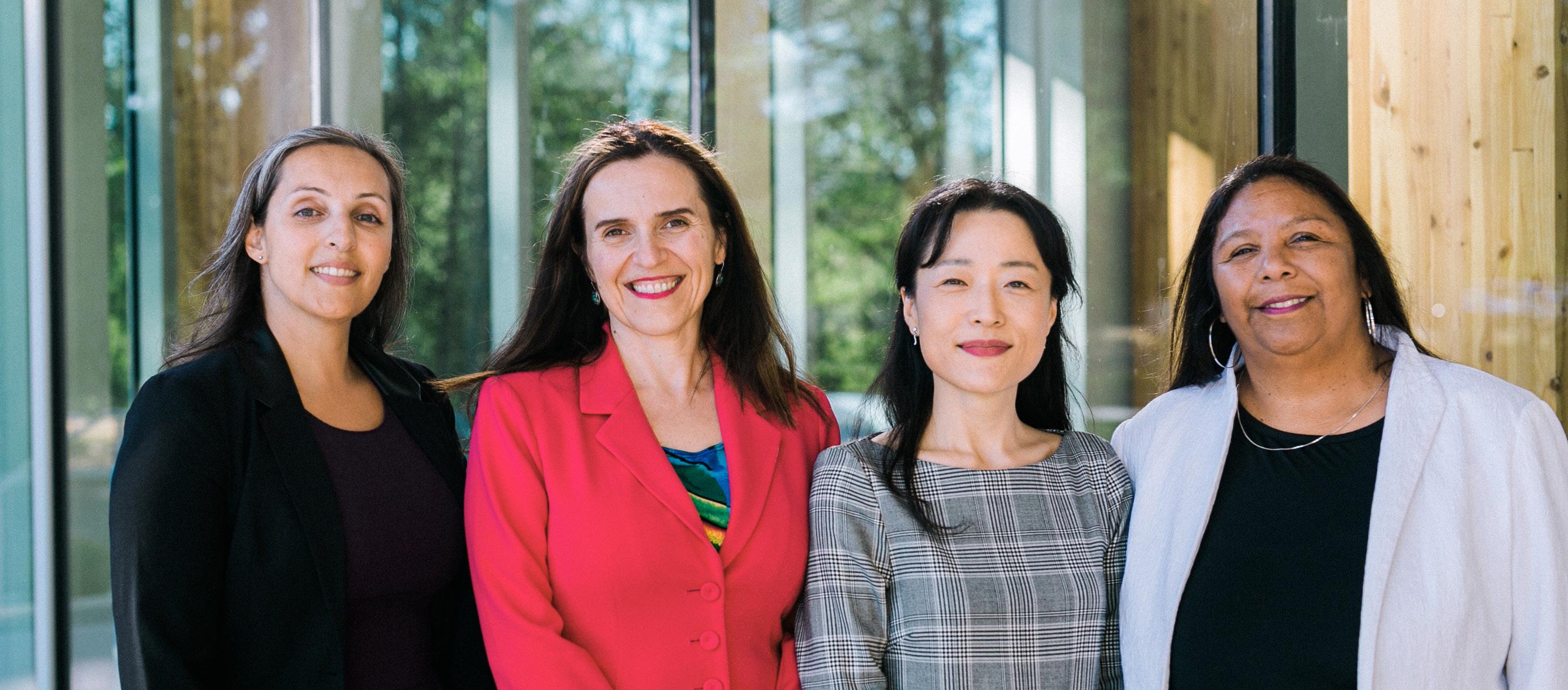
(L to R): Ruhina Rana, Ibolya Agoston, Cathy Son, Kathleen
The first PhD Cohort of four nurses began their studies in September 2022 and have passed the benchmarks of coursework, comprehensive exams, and defence of their proposals. They are now beginning their dissertation research.



TWU’s groundbreaking PhD in Nursing program actively engages a community of nurse scholars who deepen their own nursing knowledge, contribute to new nursing knowledge, and lead in academic and health-care contexts. Rooted in the Christian ethos of TWU, students develop a values-based approach to higher education, leadership, and research. The flexible and accessible online program features annual summer residences, internships in education, policy, or research, graduate seminars, and completion of a dissertation.
I am conducting a critical ethnographic study to examine workplace spirituality and religion in diverse, equitable, and inclusive healthcare organizations. The past year was marked by two significant steps in the PhD journey: writing comprehensive exams and preparing and defending my proposal. My favourite part was immersing myself in the literature on religion and spirituality in the workplace and working closely with my committee members on my proposed study.
Ibolya is the executive director of Professional Practice and Clinical Learning Northern Health and is supervised by Dr. Sheryl Reimer-Kirkham, Dr. Kendra Rieger, and Dr. Becky Palmer (Providence Health).
My research will explore the potential benefits of nurse-initiated seclusion in secure forensic mental health settings. What stands out most for me is the unwavering support from my committee— not only in their academic roles but in how they consistently show up during challenging times, offering guidance, mentorship, and ongoing encouragement. It has taught me that nursing scholarship is as much about human connection as it is about research and practice.
Stephanie is the clinical practice manager at Forensic Psychiatric Services in Greater Vancouver Metropolitan Area. She is supervised by Dr. Lynn Musto and Dr. Rick Sawatzky.
My research focus is geographically equitable access to undergraduate nursing education. I’ve been stretched in every course; intellectually, yes, but also in ways that have nurtured my growth as a human being and future scholar.. A recent transformative time for me was our public policy and knowledge translation course at TWU’s Laurentian Leadership Centre in Ottawa, as we engaged with health leaders from across Canada. It was a profound time of embodied learning: intellectually rigorous, relational, and welcoming of all worldviews.
Amanda is the BSN Experiential Learning manager at British Columbia Institute of Technology (BCIT) in Burnaby.
Fraser Health Authority is the largest partner for clinical placements for TWU nursing students. In any given year, about 60 groups are placed in Fraser Health hospital and community sites. For example, second-year students complete their acute medicine clinical rotation at multiple sites throughout Fraser Health, including Surrey Memorial Hospital, Abbotsford Regional Hospital, Ridge Meadows Hospital, Langley Memorial Hospital, Peace Arch Hospital, and Delta Hospital. These photos feature second-year groups on the last day of their medicine rotation, with clinical supervisors Cathy Son and Daniel Samudio. Along with placements at hospitals, students learn in many Fraser Health affiliated community sites, such as White Rock Public Health, TriCities Public and Home Health, Maple Ridge Public Health, Chilliwack Public and Home Health, and Abbotsford Home Health. In addition, the majority of fourth-year preceptorship placements take place in Fraser Health. We are blessed by these longstanding clinical partnerships that equip our students and generate a steady flow of well-educated RNs who work throughout Fraser Health.
Working with TWU faculty, MSN students complete impactful capstone projects that directly benefit their workplaces.
Our MSN program is also well-connected to Fraser Health, with the majority of our graduate students employed there. Working with TWU faculty, MSN students complete impactful capstone projects that directly benefit their workplaces. Most of our clinical supervisors are Fraser Health employees, and nursing faculty collaborate with Fraser Health as research affiliates. For example, TWU faculty Dr. Angela Wolff has been working with Fraser Health in community mental health and substance user services to create clinical decision tools to help health professionals routinely gather and use patient input about their quality of life for treatment and recovery planning.

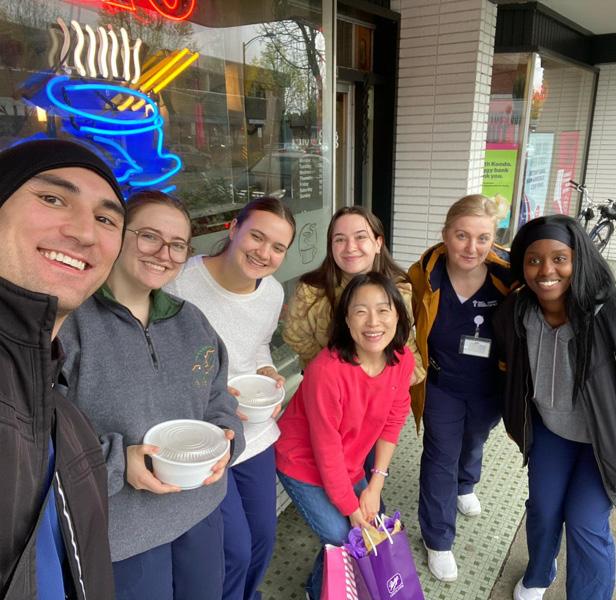
PROVIDENCE HEALTH
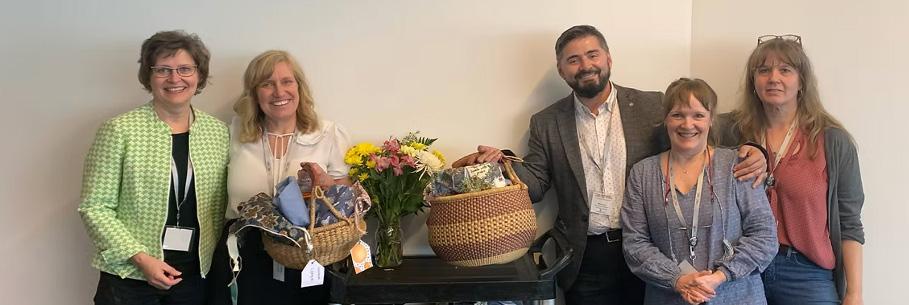
Research collaborations are at the heart of the TWU School of Nursing’s impact and innovation. Over the past three years, our partnership with Providence Health Care (PHC) has grown through a research initiative on arts-based spiritual support, led by TWU’s Dr. Kendra Rieger, and lead team members Drs. Sheryl Reimer-Kirkham (TWU Dean of Nursing) and Anne Tuppurainen, (director of Spiritual Health and Pastoral Care, Providence Health Care). Funded by a CIHR Project Grant Priority Award, they seek to advance equity-oriented, arts-based spiritual practices in health and social services.
The diverse interdisciplinary team includes several members from the TWU School of Nursing: Patti Victor Switametelót , Alysha McFadden, Rick Sawatzky, PhD students Ibolya Agoston and Kathleen Lounsbury, and research staff Jessica Wilson, Krista Heide, Amy Hildebrand, and Evy Klassen. They are actively developing and evaluating arts and spirituality initiatives that can provide more meaningful support for a range of people.
The TWU-PHC partnership has been foundational to the growth and success of this project. The collaboration began with a participatory scoping review on arts-based spiritual care and found that it can foster more inclusive spiritual care practices. This shared work sparked a series of projects and was the seed for what has now grown to three health-care and three community sites—with PHC being the inaugural site.
[The research team is] actively developing and evaluating arts and spirituality initiatives that can provide more meaningful support for a range of people.
This ongoing collaboration brings together academic rigor and clinical insight in a way that deeply enriches both research and practice. The team is grateful to Dr. Anne Tuppurainen and spiritual health practitioner clinical partners whose unwavering commitment, compassion, and depth of clinical experience have meaningfully shaped the project.
Dr. Kendra Rieger is the grateful recipient of a Health Research BC Scholar Award.

Scan here to visit ABSC page of Arts for Equity website

Bachelor of Science in Nursing (BSN)
With a whole-person approach to learning, small class sizes, award-winning instructors, simulation labs, and clinical experience, the BSN program will equip you for a meaningful and fulfilling future.
Master of Science in Nursing (MSN)
Learn from world-renowned professors, and work closely alongside them in fascinating areas of research. Grow personal and professional relationships with your cohort as you prepare to become a leader in the field of nursing.
Doctor of Philosophy in Nursing (PhD)
Join a community of nurse scholars preparing to fill much-needed leadership positions in educational or health-care organizations.
CONTACT US SOCIAL
Our admissions team is ready to answer any questions you have about TWU. Once you apply, you’ll be assigned a specific counsellor to help you along every step of the way.
t: 604.513.2019 or 1-888-GO-TO-TWU
e. admissions@twu.ca twu.ca
@trinitywestern
OCTOBER 1, 2025
MSN Spring Admission (January start)
DECEMBER 1, 2025
PhD Summer Admission (May start)
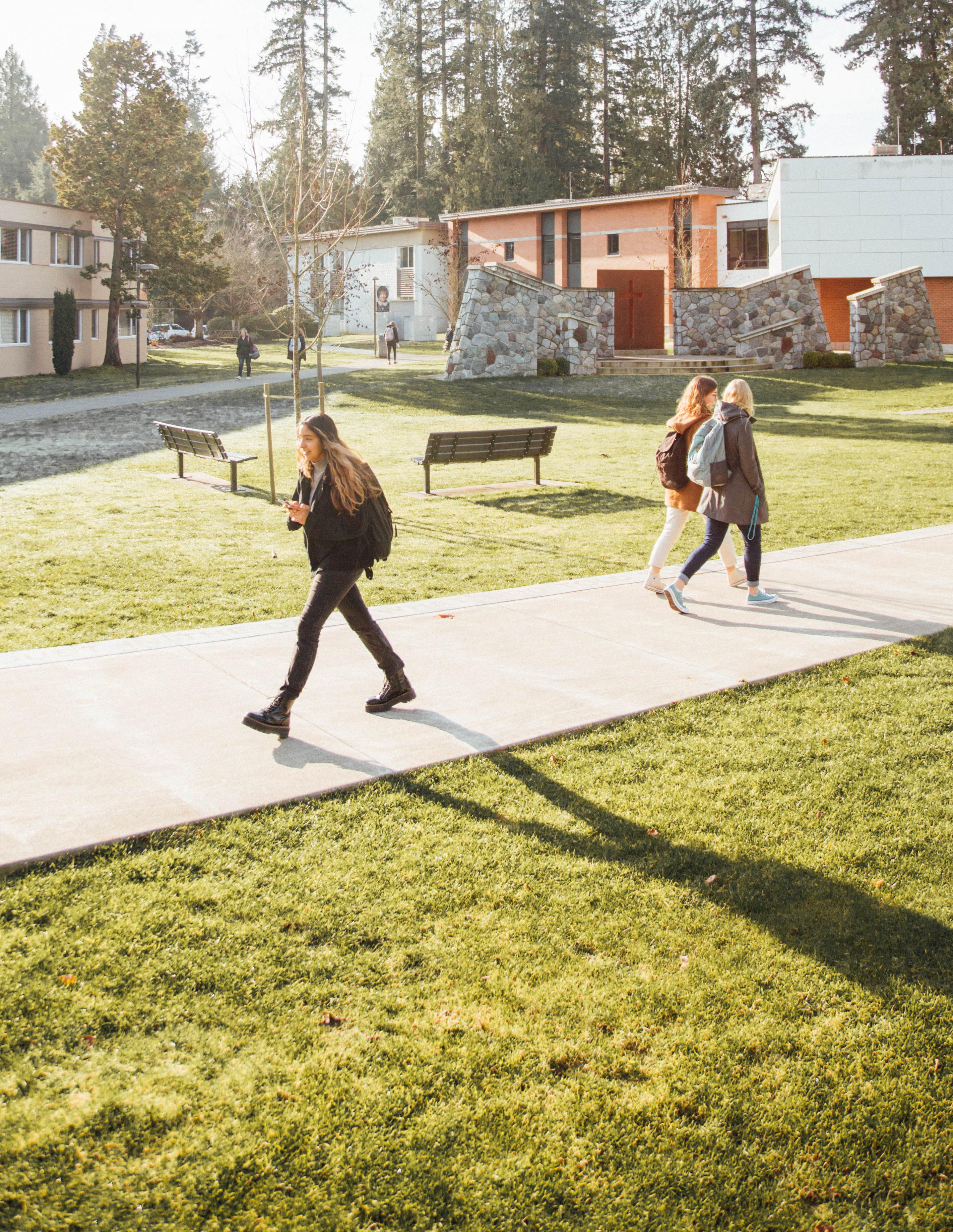
FEBRUARY 1, 2026
MSN Summer Admission (May start)
FEBRUARY 28, 2026
BSN Fall Admission (September start)

22500 University Drive, Langley BC V2Y 1Y1 Canada
P: 604.888.7511 | E: INFO@TWU.CA
twu.ca